Quick Summary:
It’s essential to select the right tech stack if you want to build a high-quality web application. CakePHP vs Laravel comparisons is frequent due to the rise in popularity of Laravel development services. CakePHP is used a lot for creating dynamic websites and excellent apps. With this blog, you will be able to make the informed decision of selecting the perfect framework for your unique business requirements.
Web technologies are developing and delivering better solutions. One such crucial technology enables the construction of potent web apps in PHP and has great potential for web development. To manage their digital demands and provide a web development opportunity, today’s modern business owners need a skilled developer on their team.
PHP, a top server-side programming language, has become one of the most popular languages for web development in recent years. In addition to being an open-source language, it also boasts a quick learning curve and a ton of useful frameworks for business-grade projects. Several PHP frameworks, which also increase application performance, enable agile development. This also helps new companies, SMEs, and large enterprises to flourish over the long run. The graph illustrates PHP’s popularity.
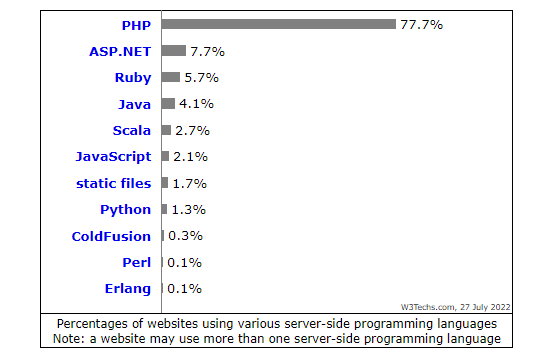
PHP is used as a server-side programming language by 77.7% of the websites, according to a W3Tech survey. The platform’s Functionality is improved when a PHP framework like Laravel or CakePHP is used. These two frameworks are potent tools for web development. The debate between CakePHP and Laravel has been going on in the web development world for a long. Due to the ambiguity this creates, it might be challenging for company owners to select only one PHP framework.
Let’s quickly examine CakePHP vs Laravel before we discuss the differences between the two frameworks.
What is Laravel?
Laravel is a PHP framework that is well-known for utilizing MVC design. A wide range of abilities is available.
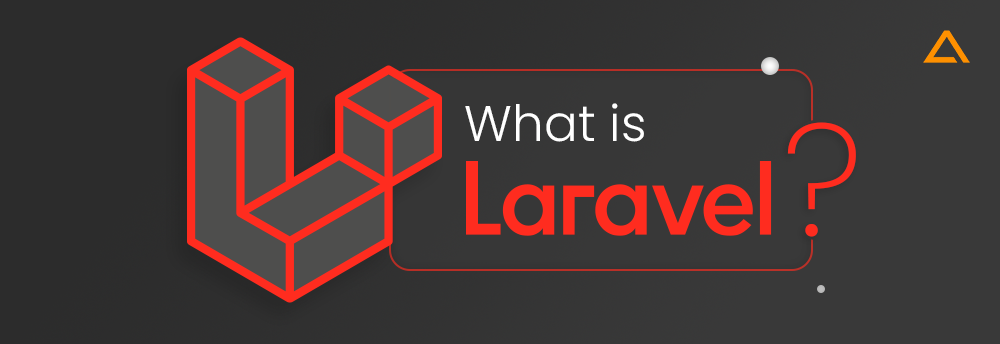
Due to its extensive selection of development tools, Laravel is recognized as a popular PHP framework for app development and helps developers work more efficiently. Because of the MVC architecture of Laravel, developers can segregate Functionality and view easily. An open-source PHP framework called Laravel offers a dizzying variety of terrifying features that aid in creating reliable web applications. Finding out that the Laravel framework, which is made up of a sizable ecosystem, supports quick deployment, routing, DB query, ORM, templating, and listing may be of interest to you.
Features of Laravel
There are various innovative features that Laravel provides for a robust, scalable, and secure website.
- Modularity
- Configuration Management
- Security & Authentication
- Supports Eloquent ORM
- Format Engine
- MVC Support
- Unit Testing
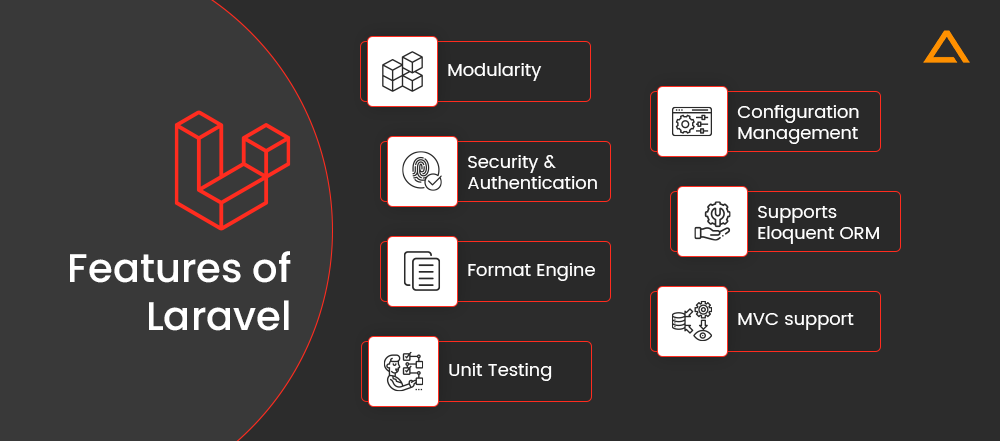
Pros and Cons of Laravel
There are advantages and disadvantages to any technology, as with any other. The same applies to Laravel. Using Laravel in your tech stack has the advantages and disadvantages listed below:
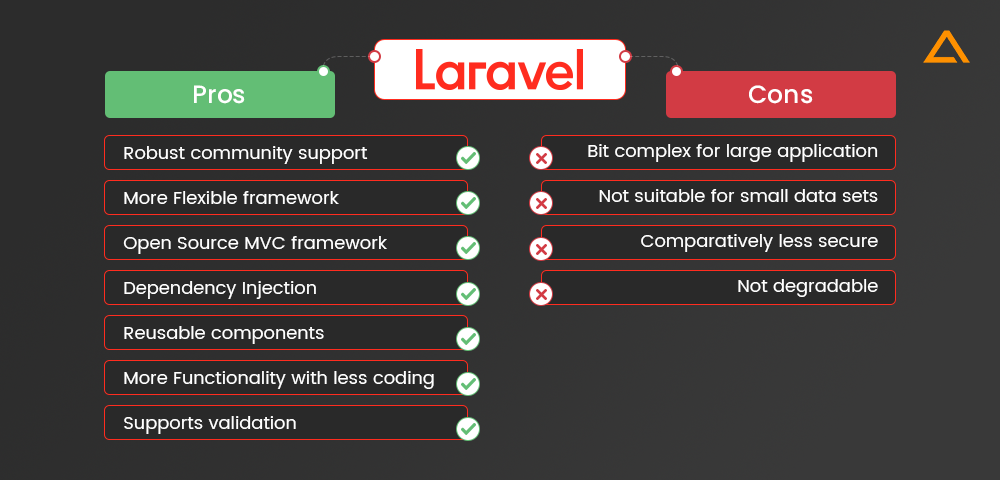
Pros of Using Laravel in Your Tech Stack
- Robust community support
- More Flexible framework
- Open Source MVC framework
- Dependency Injection
- Two-side data binding
- Provides reusable components
- More Functionality with less coding
- Supports Validation
Also Read: Laravel Best Practices 2024
Cons of Using Laravel in Your Tech Stack.
- When implemented on a large application, it can be a bit complex
- Not suitable for small data sets
- Not much secure
- Not degradable
Now that you have the overview of Laravel and its benefits its time to look other scenarios where you can and can’t use Laravel:
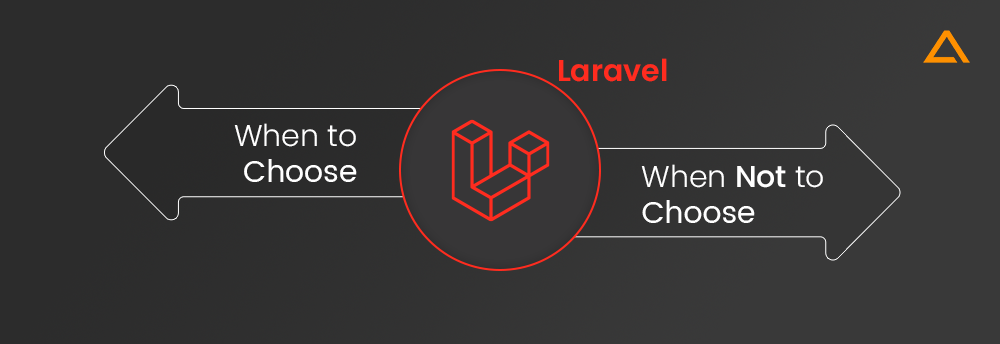
When to Choose Laravel
- As an open-source framework means faster time-to-market as it uses a two-way data binding process
- Better Authentication and Authorization Option
- When you need Automated & Unit testing
- When you need to use MVC architecture
- When your application requires to use queue system & load balancing
When Not to Choose Laravel
- When you’re not using PHP
- Building small application
- When your application doesn’t require many features
- When you’re building just REST API
- When you’re application is dealing with sensitive information
“Are you looking to hire LARAVEL Developers?”
Find the best full-stack Laravel Developers in India to start your web development project within 48 hours
What is CakePHP?
The open-source PHP framework CakePHP makes the successful construction and maintenance of web applications.
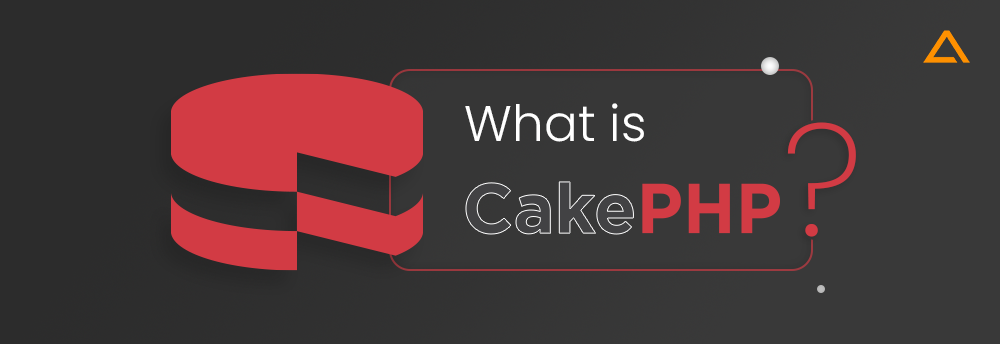
Unit testing, support for business logic, secure request processing, integrated validation, and other features are all available with CakePHP. To create quick web apps, developers may use CakePHP’s versatility. A database like PostgreSQL, SQL light, or MYSQL is also supported.
Features of CakePHP
- Robust Performance
- Developer friendly
- Built for rapid development
- MVC support
- Scaffolding and code generation tools
- Has in-built security
- Offers Flexible view templates system
- 3rd party library support
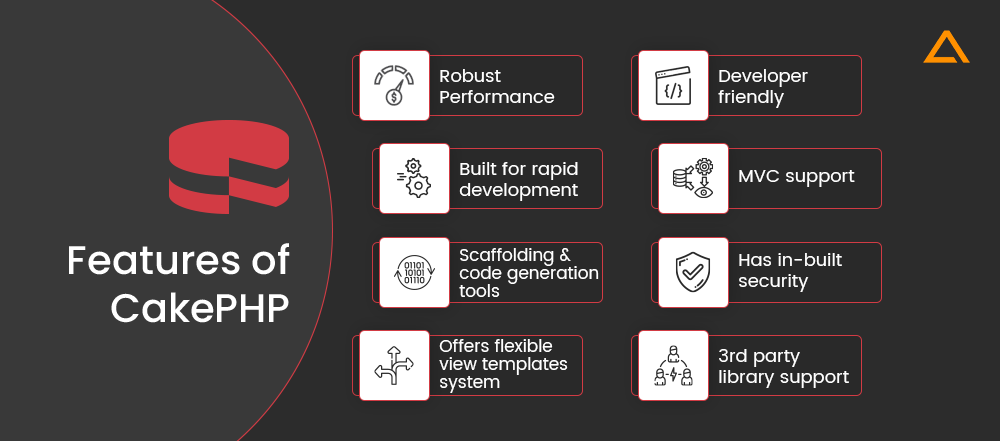
Pros and Cons of CakePHP
Every technology has two sides, i.e. benefits and limitations, and CakePHP is no different. Following are the pros and cons of using CakePHP:
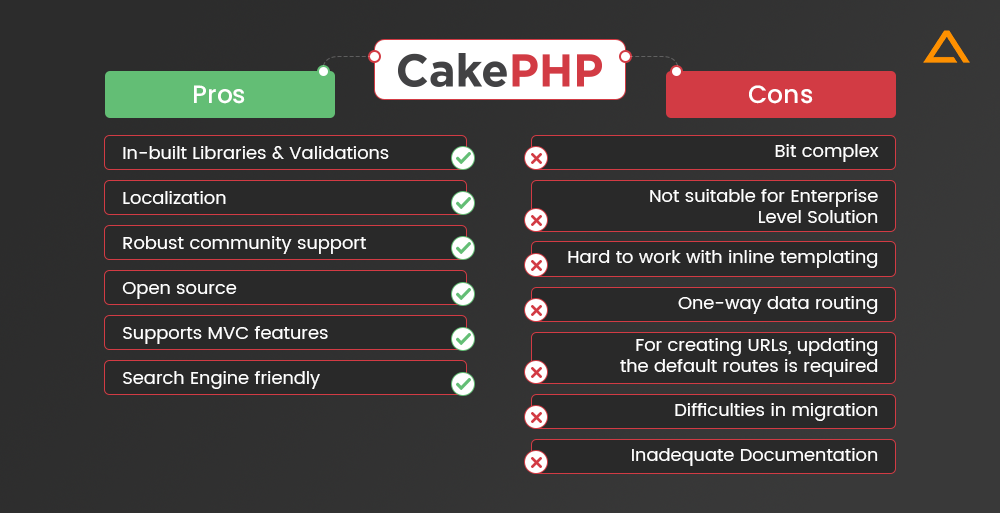
Pros of Using CakePHP in Your Tech Stack
- In-built Libraries and Validations
- Localization
- Robust community support
- Open source
- Supports MVC features
- Search Engine friendly
Cons of Using CakePHP in Your Tech Stack
- A bit complex for initial understanding
- Not suitable for Enterprise Level Solution
- As it works mainly on inline templating can create a problem for developers
- One-way data routing
- For creating URLs, you need to update the default routes
- Difficulties in migration
- Inadequate Documentation
There are certain scenarios where CakePHP will be the best choice and some where it won’t. let’s take a look at them in the section below:
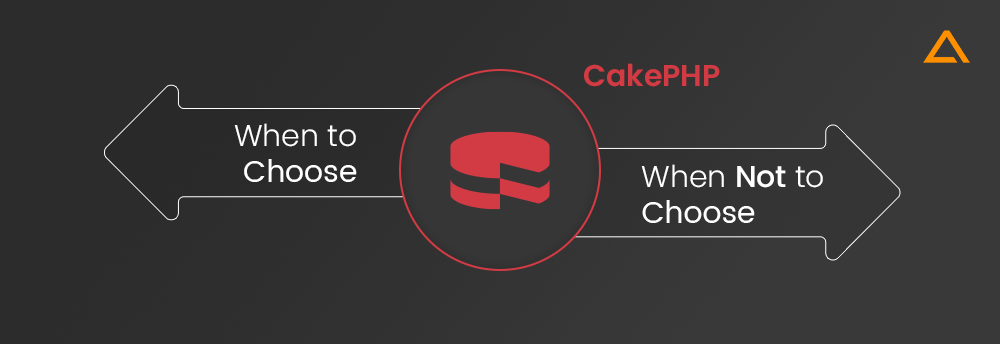
When to Choose CakePHP
- When your application requires a limited number of functionalities
- When you need MVC support
- When you require faster development
- When you need localization support
- Data sanitization support is required
When Not to Choose CakePHP
- When you need to develop an enterprise-level application
- When you’re not using PHP
- If you’re dependent on documentation for adding new features
- When you want to migrate from another version
Laravel vs CakePHP: Head-to-Head Comparison
By now, you have got the idea of both CakePHP vs Laravel frameworks. Now let’s understand the difference between both Laravel and CakePHP:
| Factors | CakePHP | Laravel |
| Developers | Cake Software Foundation.Inc | Taylor Otwell |
| Initial release | April 2005 | June 2011 |
| Stable release | 4.3.9 | 9.2.1 |
| Latest Version | Version 4.3 | Version 9 |
| Repository | CakePHP Repository | Laravel Repository |
| Written In | PHP | PHP |
| Type of Framework | Web Framework | Web Framework |
| License | MIT License | MIT License |
| Database Model | Object Relational | Document Oriented | Object-Oriented |
| Template Language | PHP | Blade Template Engine Blade |
| Programming Paradigm | Object Oriented Functional Event Driven | Object Oriented Event Driven Functional |
| Learning Curve | Less Steep Learning Curve | Steep Learning Curve |
Laravel vs CakePHP: Key Comparison
Speaking about the two frameworks’ popularity, there is no room for fabrication. Both get excellent reviews from people and are widely known. The essential distinctions between the two will now be discussed, albeit there are some parallels as well.
CakePHP vs Laravel: Performance
In the case of small applications, CakePHP provides quicker performance than Laravel. Nevertheless, because it doesn’t use a data binding technique, it is not suited for projects at the corporate level. On the other hand, Laravel is a well-known open-sourced framework that offers exceptional performance for complicated applications because of its two-way data binding procedure.
Laravel vs CakePHP: Architecture
Model, View, and Controller are the three components that make up the MVC architecture, which is what Laravel employs. Here, views provide data to the user, the model manages application data, and the controller handles database requests. Once the controller has finished dealing with the database, the view shows the data to the user and modifies the view as necessary. Two-way data-binding, which Laravel provides, enables developers to share and update data in the various component classes. CakePHP employs HMVC or Hierarchical-Model-View-Controller architecture. Model-View-Controllers, which communicate with one another, divide the components in this design. CakePHP may improve reusability, decrease dependencies, and make the application more flexible by utilizing HMVC. Unlike CakePHP, which employs HVMC design and is better suited for SME solutions, Laravel uses MVC architecture and is better suited for enterprise-level solutions.
CakePHP vs Laravel: Templating
CakePHP templates use an alternate PHP syntax to manage output and structures. They are just standard PHP files with ctp extensions. These templates are equipped with the required logic to arrange the data given by the controller into a user-friendly display format.
To create original layouts, Laravel employs the templating engine Blade. Blade views allow programmers to utilize simple PHP code to construct and arrange pages with consistency. In the resources directory, Blade compiles and caches the views for quick access. CakePHP templates may impact the HVMC structure, in contrast to Blade in Laravel.
“In Search for hire PHP Developers?”
Hire PHP Developers form Aglowid to Build the Future-ready Websites & Applications
Laravel vs CakePHP: Performance Testing
Comparing CakePHP to Laravel, performance testing is advised. Testing is simpler using the Laravel framework, especially when dealing with a larger project. However, CakePHP does not provide the data binding method. Therefore it mostly provides quick testing practice for single pages or smaller apps. For huge or multi-paged programs. Compared to Laravel, it is not as popular.
CakePHP vs Laravel: Popularity
When talking about popularity, CakePHP is far behind when compared to Laravel. For example, on Github, CakePHP has 8.5K stars and 3.5K forks, whereas, Laravel has 70.4k stars and 22.8k forks. Furthermore, according to Google Trends, in the last 5 years, there are, on average, 5 queries of CakePHP, whereas there are 68 queries about Laravel.

Now let’s talk about stackover flow trends. As you can see in the graph, the popularity of Laravel is more compared to CakePHP. The questions asked on StackOverflow for CakePHP is 31,626, whereas, on the other hand, Laravel has around 195,250 questions:
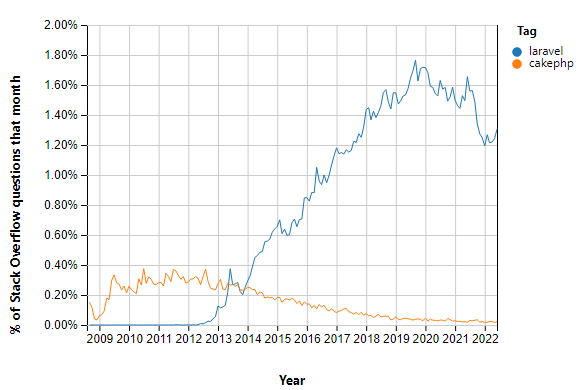
Laravel vs CakePHP: Market Share
According to SimilarTech, Both frameworks are popular, although Laravel is seen in Computers, technologies, electronics, Government, Entertainment, business, consumer services, Science and Education.
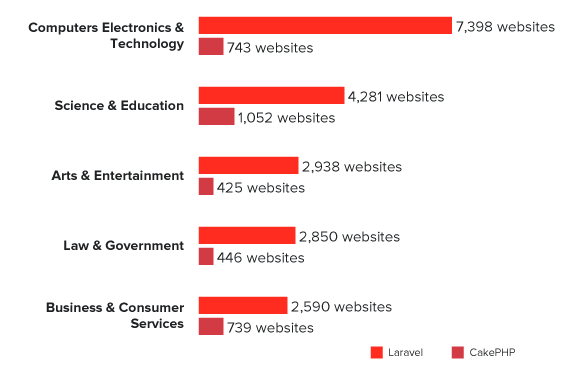
Laravel is leading in most countries, including the United States, Russia, China, Brazil, and 160 other countries. CakePHP, on the other hand, is popular in science, education, business, computers, and more fields. CakePHP is leading in Saint Lucia and Haiti. Laravel is leading in the TOP 10K sites, Top 100k, Top 10M sites, and the entire web. While CakePHP is far behind Laravel in all segments.
Laravel vs CakePHP: Community Support
Both frameworks have robust community support, but if we are talking about documentation, Laravel has extensive documentation libraries, whereas CakePHP is not popular for documentation support.
CakePHP vs Laravel: Data Binding
In terms of data binding, Laravel is less effective than CakePHP since it relies on a two-way binding procedure, which makes it more complicated. However, CakePHP features a simpler and easier routing method than Laravel and doesn’t offer any data binding.
Laravel vs CakePHP: Backup & Handling
From the standpoint of data backup and handling, Laravel provides a better method and is thus preferred to CakePHP. On the other hand, CakePHP is less desirable from a data backup and management standpoint because it mostly works on smaller projects.
CakePHP vs Laravel: Salary Comparison
When trying to create a career in one of these programming languages or frameworks, salary comparison is an important topic. In the market, there are several demand points for both CakePHP and Laravel, each with its strengths. However, before making that choice, it is crucial to know the responsibilities of a developer because the typical salaries for both frameworks are comparable.
- The average salary of CakePHP in the USA is $90,501 /yr
- The average salary of Laravel in the USA is $90,501 /yr
- As both are PHP frameworks, there is no difference in the salary range
Laravel vs CakePHP: Jobs Availability
The availability of jobs on both platforms is a crucial factor for candidates to consider. You may search the job listings for these two technologies on several reliable employment websites. The popularity and demand of CakePHP vs Laravel would directly influence the availability of jobs. For example, on LinkedIn, the number of open positions for CakePHP and Laravel is now as follows:
There are 15,161 results available for Laravel Developer on LinkedIn, whereas there are 9,537 results for CakePHP developers.
CakePHP vs Laravel: Popular Applications
Like any other technology, several technologies use both frameworks in their tech stack.
Popular Applications Built with Laravel
- Bitpanda
- 9GAG
- Mastercard
- Deloitte
- Wattpad
- Tesco
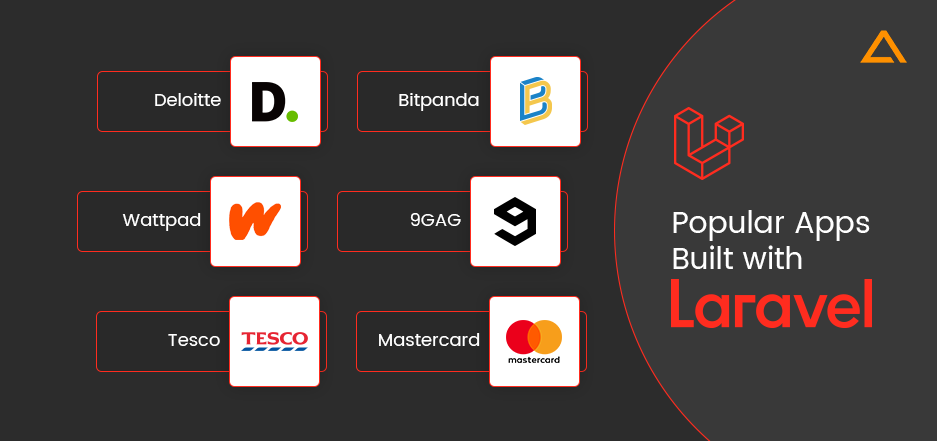
Popular Apps built with CakePHP
- Growtix
- Coconala
- Passport America
- Miyashimo Studio
- Axia Technologies
- Printivo.com
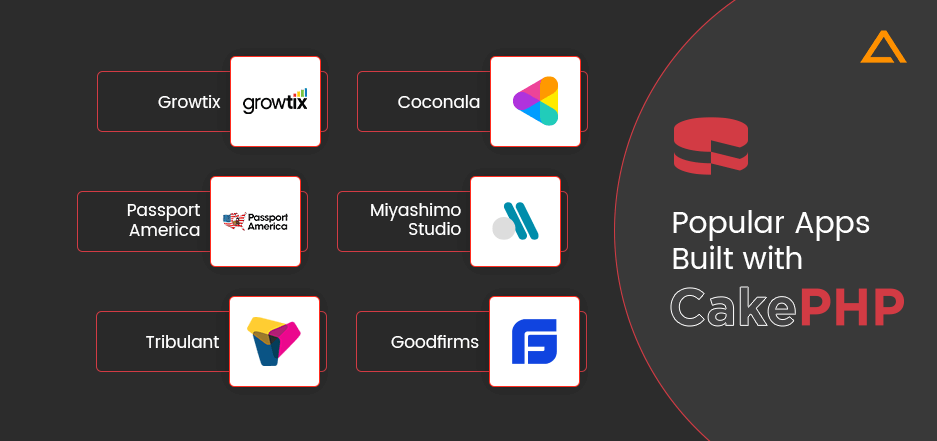
Laravel vs CakePHP: Scalability
Large-scale projects are regarded as appropriate for Laravel. Consequently, using Laravel development services is very advantageous for your company. Therefore, Laravel is undoubtedly a winner when discussing scaling. On the other hand, due to its suitability for small projects, CakePHP falls short of Laravel in terms of scaling. Therefore, Laravel is a better choice than CakePHP when scaling is crucial to your business.
CakePHP vs Laravel: Documentation
CakePHP’s documentation is inadequate and less thorough than Laravel’s. In contrast, Laravel offers thorough documentation and community assistance.
Laravel vs CakePHP: Plugins
Laravel framework offers plugins but not much variety as CakePHP. In comparison, CakePHP frameworks offer various Plugins to handle tasks. This plugin allows developers to reuse code.
CakePHP vs Laravel: Testing
Unit testing and feature testing are Laravel’s two options for testing your application. You can test classes, models, and controllers using unit testing, whereas you can test the entire codebase using feature testing. In contrast, CakePHP provides both unit testing and web testing as two more approaches to testing your application. You can use web testing to test various website components to find and fix bugs automatically. In contrast, unit testing enables you to test specific portions of your code. Good testing features are provided by Laravel and CakePHP alike.
Laravel vs CakePHP: Security
Laravel provides fundamental security features, including XSS reset protection, user authentication, password validation, password reminder, and more. While CakePHP has cutting-edge security technologies, including encryption, hashing, and decryption. In addition to these restrictions, CakePHP also manages call-backs for blackholes and prohibits cross-controller communication. As a result, CakePHP should be chosen over Laravel wherever security is an issue.
CakePHP vs Laravel: Objection Relational Mapping
Eloquent ORM is a component of both CakePHP and Laravel. You can structure the application’s database rapidly thanks to Laravel’s swift and straightforward nature. Laravel ORM is Strong and expressive whereas, CakePHP’s ORM is a bit more difficult to learn because it was a late addition. Because of a few small anomalies, Laravel offers two opportunities: Data Query and ORM. This might make it difficult to utilize. However, simple functions are easily understood for both. Because we are not required to employ established connections like in CakePHP, we occasionally prefer Laravel’s relationship construction method. Eloquent ORM and Query Builder inconsistencies lead Laravel to have a greater rate of problems while attempting to get the results of queries.
Conclusion
Following a comparison of Laravel vs CakePHP on several different criteria, it can be said that each framework has advantages and disadvantages of its own. Therefore, developers should learn about and compare the many characteristics of CakePHP vs Laravel before selecting one of the frameworks. Then, to get the desired result, one of these frameworks should be chosen depending on the amount of work required, the type of project required, and other factors that have been described.
have a unique app Idea?
Hire Certified Developers To Build Robust Feature, Rich App And Websites
Also Check:
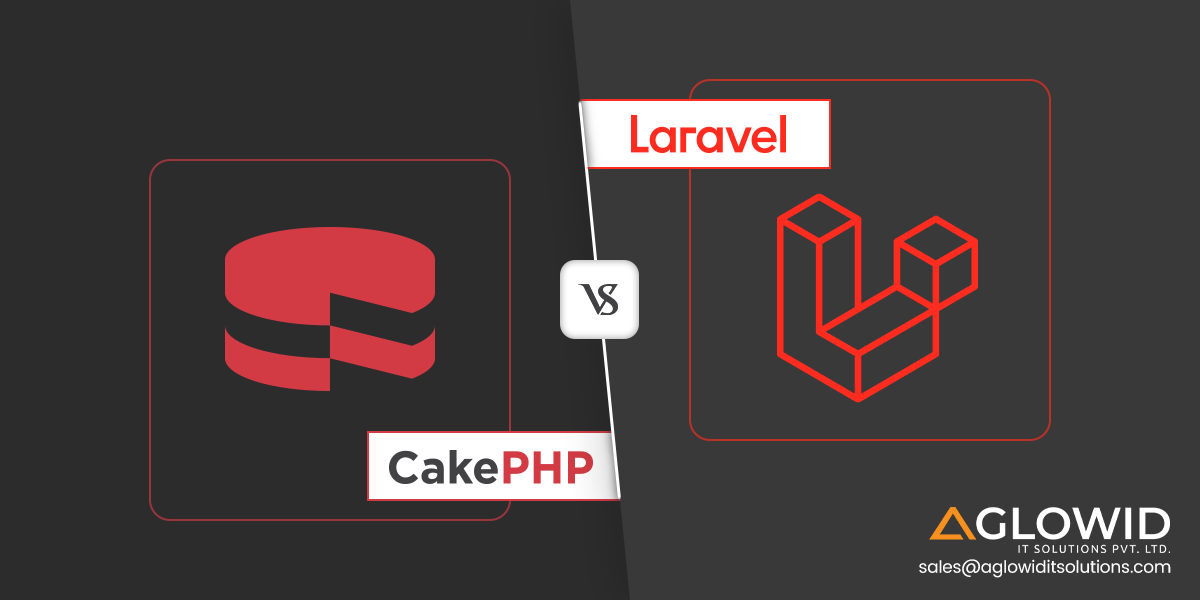
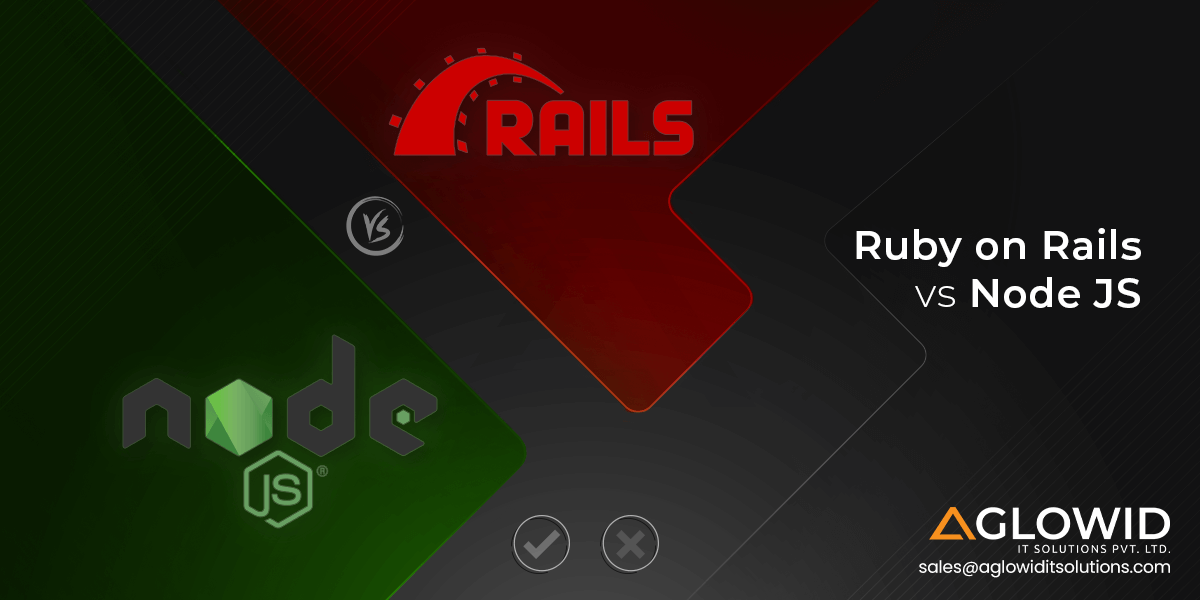
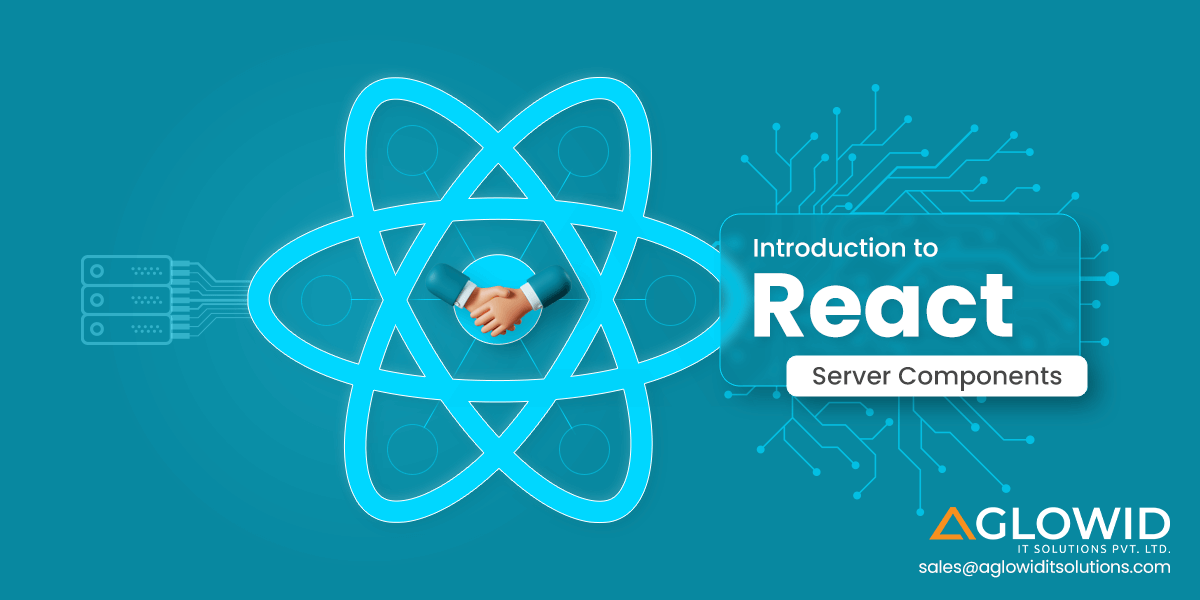


 Say
Say